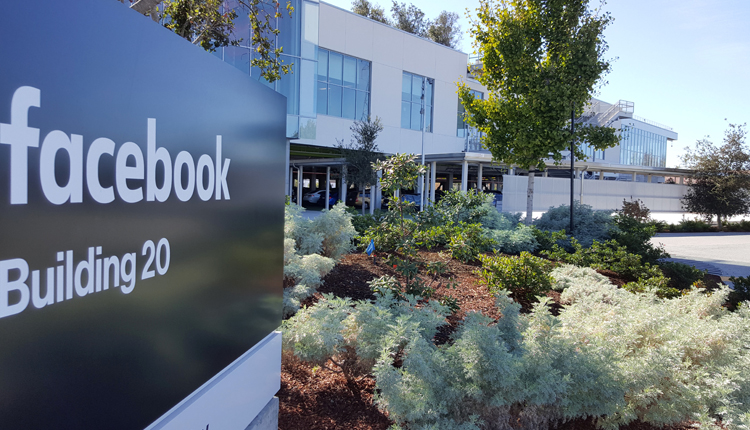Facebook Inc. is launching two video call machines for the home in the midst of its latest data breach scandal.
The Portal products automatically zoom in on users and follow them as they move, to offer a superior experience to existing smartphone and tablet apps.
The devices rely on Facebook Messenger to make and receive calls and also feature Amazon’s Alexa smart assistant.
But consumers may have privacy concerns and a rival device-maker suggested the very concept was “tech clutter”.
“It’s staggeringly unfortunate timing,” commented Jeremy White, product editor at Wired UK magazine.
“News of the accounts being hacked broke the day before [Facebook’s] product briefings.
“The question is whether people will ignore security concerns for the sake of a really convenient device.”
Andrew Bosworth, the executive responsible for the launch, acknowledged the issue.
“We understand that inviting a camera and microphone into your home is the kind of thing that will give a consumer pause, especially for a new category of products around video calling that haven’t been really common for consumers to have access to,” he told the BBC.
“And so not one week ago nor six months ago, but two years ago we started on a privacy-first plan for this product.”
The devices will go on sale in the US in November.
Facebook intends to release them elsewhere but has yet to say when.
The chief executive of Sonos – which makes voice-controlled speakers – is among those to have questioned whether there is an appetite for Portal or other similar products.
“At this point I’m pretty sceptical that consumers need another screen in their homes,” Patrick Spence told the BBC.
How do the Portals work?
Both of the Portals are designed to be used from a distance of between 5ft to 10ft (1.5m to 3m) – further than video calls are typically made from using smartphones and other computers.
They use a 140-degree 12 megapixel camera to capture a relatively wide field-of-view, providing scope for on-device software to zoom in and track the users’ movements.
In SmartCamera mode, the machines automatically reframe the image to take account of additional people entering the room.
But by tapping on a person’s face, the user on the other end of the call enters Spotlight mode. This allows them to focus on an individual of their choosing, letting – for example – a grandmother follow her grandson even if his parent is the one talking.
Augmented reality graphics can be overlaid on to the image. Some are for comedic effect – for instance putting cat hats on people’s heads. But the tech is also used for a selection of stories, which a parent can read from afar while relevant visual effects appear.
Users can also trigger songs from Spotify or Pandora to be played simultaneously on both their own Portal and the one receiving the call without causing an echo effect.
In addition to one-on-one calls, up to seven Portals can take part in group chats.
Calls can also be routed to the Messenger app on other kinds of devices although some functionality is lost.
The flagship device – the Portal+ – features a 15.6in (39.6cm) 1080p display that can be rotated on its stand to appear in landscape or portrait mode. It is priced at $349 (£270).
The lower-end model – which is just called Portal – has a 10.1in 720p display and less powerful speakers. It costs $199.
Both support up to four accounts, allowing family members to maintain separate contacts and call records that can be password-protected.
What are their privacy features?
Tapping the top of the devices allows users to switch off their microphones and cameras. In addition, a plastic camera cap is included to ensure no images are recorded when owners just want to use voice commands.
Facebook says it does not record, listen to, view or otherwise analyse the content of calls on its servers, and the data involved is encrypted.
But it does log metadata, including who called who, the length of the calls and any performance issues.
And while the call data is digitally scrambled to make it difficult to hack, the encryption method used is not “end-to-end”.
This means, in theory, that Facebook could allow the authorities to tap into a call if ordered to do so.
“It would be better if this had end-to-end encryption, and you have to wonder why it doesn’t when you recognise that WhatsApp – another part of the Facebook empire – uses it,” said Wired’s Mr White.
Facebook did reveal that it was investigating whether to offer WhatsApp as an alternative to Messenger.
“WhatsApp would certainly help a lot with an international launch,” said Mr Bosworth.
Last month, it emerged US law officers had recently tried and failed to force Facebook to let them wiretap a criminal gang’s Messenger voice calls.
More apps… and ads?
At launch, there will only be a small number of apps available, including:
- Facebook’s video show service Watch
- recipes from the Food Network
- video news updates from Newsy
For now, the firm has opted not to provide access to its Facebook or Instagram News Feeds or to provide an app store for other third-party products.
It also says adverts are not on its roadmap, although it acknowledged that in time on-device software could, for example, trigger a cat food promotion if it spotted a pet in shot.
“We’re not doing anything today and we’ll be very transparent and clear publicly if we do start to do something beyond that,” said a spokesman.
Source: BBC


